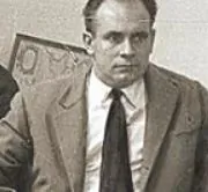Gilles Martinet
( journalist, politician) | ||||||||||||
|---|---|---|---|---|---|---|---|---|---|---|---|---|
 | ||||||||||||
| Born | 8 August 1916 Paris, France | |||||||||||
| Died | 29 March 2006 (Age 89) | |||||||||||
| Nationality | French | |||||||||||
| Alma mater | Lycee Carnot | |||||||||||
| Member of | Trilateral Commission | |||||||||||
French politician, TLC, attended the 1971 Bilderberg
| ||||||||||||
Gilles Henry Auguste Albert Martinet was a French journalist, resistance fighter, freemason, politician and diplomat. A journalist and politician on the anti-Soviet left, he with ended up in the Socialist Party.[1] He attended the 1971 Bilderberg meeting and was a member of the Trilateral Commission.
Background
Martinet was born in Paris on August 8, 1916, te son of a landscape architect. He attended the Lycee Carnot.
Having graduated from school at the age of 16, Gilles Martinet was forced to interrupt his studies in 1936 when his father died, ruined by the crisis of 1929.
He then became an editor at the Havas new agency, and then resumed studies that he conducted in parallel with his work. These lead him to a bachelor's degree in literature and a graduate diploma in history.[2]
Politically, he was first a supporter of communism in the early 1930s, and became secretary of the Union of Communist Students of Paris at the time of the Popular Front. He joined the Communist Party in 1935, participated in their 1937 congress, but left in 1939, after the Moscow trials.
Press career
He joined the Resistance in 1941, went underground in 1943, and became a journalist by participating in the publication of underground newspapers.
In 1944, he took over the management of the French information Office, the future Agence France-Presse (AFP) with the help of a section of the French Forces of the Interior (FFI), a position he retained until 1947, when he refused to censor information on the Indochina war. The government then imposed his departure from the management. In 1950, with Claude Bourdet and Roger Stéphane, he created L'Observateur. Gilles Martinet was the editor-in-chief from 1950 to 1964, when Claude Perdriel bought the newspaper, which became le Nouvel Observateur. Gilles Martinet kept the position of administrator until 1985.
In parallel with his journalistic career, Gilles Martinet continued his political career. In 1945, he joined a Trotskyists group, and continued in the next decades in various anti-Soviet and anti-Gaullist leftist parties.
His commitment against the Algerian War made him one of the targets of the ultra nationalists, and his apartment on the boulevard Flandrin (Paris) was bombed in 1962[3].
In 1958, Martinet participated in the launch of the Union of Democratic Forces (UFD) alongside Pierre Mendès France, Édouard Depreux, François Mitterrand and Daniel Mayer. The UDF then became the Union of the Socialist Left (UGS)). Martinet was a member of the national bureau of the UDF. In 1960, Martinet co-founded the Unified Socialist Party (PSU). He was deputy national secretary of the PSU from 1960 to 1967.[4]
He finally joined the Socialist Party (PS) in 1972. He became a member of the executive board of the PS in 1973.
In 1979, he was elected Member of the European Parliament on the Socialist Party list.
After the victory of the left in 1981, he was appointed French ambassador to Italy, a position he held until 1984.
After 1984, he no longer appeared at the forefront of political action.
In 1988, he was a member of the cabinet of Michel Rocard, then Prime Minister.
The end of his life was marked by declining health until disability.
He was a member of the masonic lodge Grand Orient de France.[5]
Event Participated in
| Event | Start | End | Location(s) | Description |
|---|---|---|---|---|
| Bilderberg/1971 | 23 April 1971 | 25 April 1971 | US Vermont Woodstock Woodstock Inn | The 20th Bilderberg, 89 guests |
References
- ↑ https://maitron.fr/spip.php?article120679
- ↑ https://www.whoswho.fr/decede/biographie-gilles-martinet_1412
- ↑ Serge Garde, Valérie Mauro et Rémi Gardebled, Guide du Paris des faits divers. Du Moyen Âge à nos jours, Le Cherche Midi, 2004, p. 259.
- ↑ https://www.ex-pcf.com/index.php/liste-alpha/306-martinet-gilles
- ↑ https://www.lemonde.fr/archives/article/1975/01/15/debat-polemique-autour-du-theme-de-la-fraternite_2602492_1819218.html